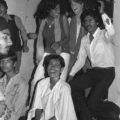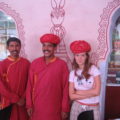I’m trying to remember how young I was when I first realized that, as a girl, I was more likely to be a target than boys were.
It might have been when I joined an inner-city Pittsburgh school for 5th grade. I had problems fitting in there. I was already a weird, traumatized kid, just returned to the US due to my parents’ divorce after being raised in Thailand. It’s not surprising that I was teased a lot in school. Many kids were (and still are, only now it’s called bullying.) But there’s always specific content to teasing. Let’s examine the taunts that were leveled at me.
One of the things I was teased about was my butt, which stuck out, or at least people told me it did (perhaps I was a bit sway-backed). A pop song that had been popular before I returned to the US in 1971 had a line about “Bertha Butt, one of the Butt sisters”. I had never heard the song, and was baffled (and hurt) when one of the boys in my class sang that line at me. Over and over again.
Another excuse for teasing was my clothing. In Thailand, I had not owned any clothing suitable for the Pittsburgh climate, and, my dad having left his job to go to grad school, we couldn’t afford to buy much. So I kept what clothing I had, even if it didn’t fit very well. In 1971, fashionable jeans were bell-bottoms with cuffs that swept the ground. Mine were too short, and flapped around my ankles. “High-water jeans!” the kids yelled. “Where’s the flood?” It was so bad that, even in later years as fashions came and went, I cannot bear to wear trousers that don’t reach my shoe-tops.
I was given a tooled leather headband to wear, to keep my long, straight, hippie-fashionable blonde hair out of my eyes, in a hippie-fashionable fashion. I loved it – until I wore it to school. “Dog collar!” the kids all shrieked (which was illogical, I thought in one corner of my mind – it wasn’t around my neck). I took it off and never wore it to school again, maybe never wore it again at all. At least that was an optional accessory, not something I needed to wear every day, like the jeans.
It is perhaps telling that these 5th-grade insults were about my body and how I dressed it. I was different from my peers in Pittsburgh in far more fundamental ways, and we all knew it, but this was the easiest line of attack. And it worked.
Another girl in my class was already reaching puberty and sprouting breasts. This was uncommon for 11 year olds in 1972. I don’t recall her being teased directly – the boys in our class were a bit too young to be anything more than puzzled – but the girls muttered in shocked whispers that she already had her period! As if this was somehow her fault, and made her indefinably dirty. Again, it was all about her body.
Then there was the incident in the alley. We lived in an old brick apartment building on Ellsworth Avenue. My dad used to send me the two or three blocks up to the drugstore on Walnut Street to buy his cigarettes (yes, they sold them to me). The shortest route was through the parking lots and alleys between and behind the apartment buildings, a route which, while not cramped or dark, was usually deserted.
One day I was almost home from a cigarette expedition when two boys a bit younger and smaller than myself accosted me in a parking lot behind our building. I didn’t know them, though they probably went to the same school as me. They didn’t seem to want anything specific, but they flanked me and began taunting me in a definitely threatening way. As I took a few hurried steps to try to escape, they grabbed my arms, and one of them attempted a punch that landed as a glancing blow on my cheek – not that painful, but shocking. I had never been hit before. I took the only defensive measure I could think of: I yelled “Get the fuck away from me!” This shocked them; 11 year olds didn’t use the word “fuck” in those days, even in the seedier parts of Pittsburgh. They hesitated long enough that I was able to break free and sprint up the fire escape to the window of our third-floor apartment. I was terrified that they were following me, and arrived crying.
When my dad heard my story, he rushed downstairs, but the boys had disappeared. He called the police, who came, heard me out, and nodded wearily: these two young boys were already familiar to them. The police escorted me and my dad to the home of one of the boys, where we met the mother and told her what had happened. I don’t remember what she said, nor do I know what punishment the boys may have received. I never saw them again. But I never walked in that alley again, either.
That attack was not sexual in nature. I’m not even sure what their intent was, and maybe neither were they. But it probably would not have happened to a boy. As a girl, even a slightly bigger and older one, I was perceived by these boys to be vulnerable.
Soon after the start of 6th grade, I changed schools because the bullying progressed beyond verbal. Then a bunch of other stuff happened, so that, after repeating 6th grade, I ended up doing 7th grade in a school in Norwalk, CT. I was still a weirdo, and the teasing continued, no longer physical, but now focused on my relationships.
There was a boy in my class, John Stumpf. With that name, he of course was teased. He was also a kind and serious boy, at an age when most boys, as far as I could tell, were mean and acted like they were stupid, even if they weren’t.
We liked each other. The other kids noticed. “Put your head on his sho-o-o-oulder…” they would croon, referencing yet another pop song I wasn’t familiar with. “Hold him in your arms, Deer-dee!” (They delighted in getting my name wrong, too – how dare I have a weird name that was hard to pronounce?)
No one in our class was “going together”, though we were certainly aware of the possibility. The girls were all well into puberty, and the boys were now old enough to notice. Budding breasts are tender – that’s why you so often see pubescent girls clutching ring binders and books protectively to their chests when walking through crowded school hallways. The boys knew this, and some took special delight in slamming into us. They knew that it hurt (a lot!), but also knew that we were too embarrassed by the cause of the hurt to say so or complain about it.
John and I actually defied our classmates, at first. We hung out together at his house after school. I helped him with his paper route. We talked. Cleaned the Habitrails of his pet hamsters. I don’t know whether we really felt romantic or not; maybe we were both just lonely, and happened to be compatible as friends. John’s mother was thrilled that John “had a girlfriend”, and she drove us to our first “date”: a Hitchcock movie (“Family Plot”) followed by pizza.
But after a while we couldn’t take the teasing at school anymore. We “broke up”, avoided each other in shame, and never spoke again.
My best friend was Amy, another lonely weirdo, in my grade but a different class. Neither of us had many other friends (maybe none, at school), so we hung out together at recess and lunch, and visited each others’ homes after school and for weekend sleepovers, listening to Barry Manilow and trading stickers.
My classmates couldn’t leave this one alone, either. They’d walk by as we sat together in the playground, and shout: “Lesbie friends!” At least, because we did not have classes together, the barrage was not constant, and our friendship survived it.
Soon after the start of my 8th grade year, in 1976, my family moved to Bangladesh, where my dad was the local head of Save the Children. I turned 13 that November, and had been growing breasts for a while. Now that they weren’t hurting anymore, I didn’t think much about them, and neither my dad nor my stepmother Nancy noticed that I didn’t own any bras. Nancy was small-breasted and, as a matter of feminism and fashion, rarely wore a bra at all, so it may not have occurred to her that I might grow breasts big enough to need support.
In 1977, after it had been decided that I would go to boarding school in the Indian Himalayas, it was difficult to put together a wardrobe fit for that climate, that would fit me. Again, no one thought of bras. Until, as recounted earlier, “I took a dip in a cold river (wearing a T-shirt) during our 9th grade class hike, exciting much comment [among my classmates]. Then my family had to scramble to get hold of some bras somehow.” I had transgressed a norm that I didn’t even know existed.
However, in both Bangladesh and India, I was learning to be cautious about how I was perceived by the male gaze.
There were school rules intended both to protect us and to “not offend” local sensibilities. Girls couldn’t wear “revealing” clothing; shorts were only allowed for sports. “Public displays of affection” between girls and boys were forbidden. Boys could go on overnight hikes in groups of three or more. This option to take off on a whim on just about any weekend was a great freedom that some of the boys took full advantage of. Girls could not go on overnight hikes except with adult chaperones; such trips were far harder to organize, and did not occur often.
We girls had few problems during Saturday excursions in our “hometown” of Mussoorie, because most of the people we saw in the bazaar knew the school and had known us individually for years: they were the shopkeepers and restaurant owners who sold us food, the tailors who made our clothing, the mochis who made our shoes, and often they were related to people who worked at the school as bearers (food servers), cleaners, etc. We were more or less family to them, and therefore treated with respect. Most of the time.
Except that time that I went to the local hospital for a chest x-ray, which required me to strip to the waist, put on a hospital gown, and stand up against a cold metal plate. The male x-ray technician was the only other person in the room. He came up behind me and grabbed both my breasts, moving and squeezing them, on the pretext of positioning me correctly for the x-ray. It took me a few long seconds to realize that this handling probably wasn’t actually necessary. He stepped away before I summoned the courage to say anything, and, after the fact, I was too confused and embarrassed to complain. No doubt he counted on this, and I probably wasn’t the only one he did it to.
Outside Mussoorie – or when outsiders came in, during the hot weather tourist season – it almost didn’t matter how we dressed or behaved: as foreign females, we were assumed to be “easy”, and many Indian men treated us accordingly. Staring, cat-calling, groping on crowded buses and trains – most of us experienced all of this, some worse. As far as I know, no one from our school was ever raped in India, but… I might just not know about it.
We were all trained to be extremely cautious. Don’t go out alone. Even in a group, if it’s made up of only girls, don’t get into situations where you’re trapped and outnumbered. Don’t look lost. Don’t ask for directions. Don’t show your legs or any portion of your chest. Don’t go out at night. Ignore the stares and comments, don’t answer back. Don’t look men in the eye. Don’t trust strange men, in any situation. (Don’t drink or do drugs went without saying: we were teenagers at a Christian school.)
All these rules became so deeply ingrained in my habits and psyche that I stopped noticing or thinking about them, and probably still don’t most of the time. Wherever I am in the world, I unconsciously censor my own behavior, dress, and movements, to stay safe. I now enjoy the novel (to me) sensation of feeling attractive, but… not too much. If a man looks at me too long, or in the “wrong” way, I get nervous, and wonder if I should be dressed differently.
Perhaps the worst part is: forty years on, the world isn’t any safer for women. My daughter grew up in Italy, a “civilized” country (Italians are offended to be compared with Indians), but I had to teach her the same lessons that I learned, to help her stay safe. And this shit still happened to her.
Related reading:






